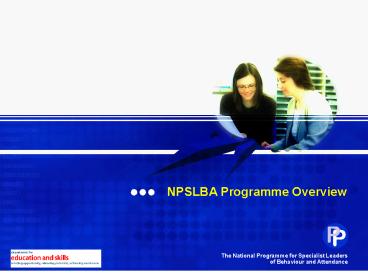NPSLBA Programme Overview - PowerPoint PPT Presentation
1 / 15
Title:
NPSLBA Programme Overview
Description:
Training for all staff Secondary Strategy and Primary Strategy, ... Connexions Advisers. KS3 B&A Consultants. Leading Teachers in Primaries. The Training Process ... – PowerPoint PPT presentation
Number of Views:46
Avg rating:3.0/5.0
Title: NPSLBA Programme Overview
1
NPSLBA Programme Overview
2
National Programme for Specialist Leaders of
Behaviour and Attendance
The National Strategy for Improving Behaviour and
Attendance
- Elements of the strategy
- Training for all staffSecondary Strategy and
Primary Strategy, Support Staff Training, ITT
training - What we teach Social Emotional and Behavioural
Skills (SEBS) development. How we teach it. - Specific interventions Behaviour Improvement
programme (BIP), Anti - Bullying Alliance,
Truancy Initiatives, Violence Reduction In
Schools (VIRIS) - Additional Provision LSU/ PRU development,
Multi Agency teams (BESTS), Learning Mentors - Leadership Lead Behaviour Professionals,
National Occupational Standards
3
National Programme for Specialist Leaders of
Behaviour and Attendance
Who will drive forward this agenda in schools?
The National Programme for Specialist Leaders of
Behaviour and Attendance
- Specialist training in behaviour and attendance
leadership - Establishing a professional identity amongst
staff - Integral to the national strategy for B A
- Qualifications at 3 levels based on learning
outcomes - Promoting a career for all with the aspiration to
help school improvement - Delivered nationally through cluster training
- Regional support in the nine government regions
4
National Programme for Specialist Leaders of
Behaviour and Attendance
Aims of the NPSL-BA
- To raise professional status of staff working in
B A - To identify how we are doing
- To identify and promote career paths
- To improve recruitment and retention
- To extend leadership skills amongst B A staff
- To develop high level training programmes
- To establish qualifications
- To create and maintain networks
- To promote BA leadership roles in school
organisation
5
National Programme for Specialist Leaders of
Behaviour and Attendance
Qualifications
- Available at three levels
- Advanced (Level 3)
- Extended (Level 4)
- Masters Level
- Masters level is available after the first year
6
National Programme for Specialist Leaders of
Behaviour and Attendance
Context
- The programme complements and supports
- The Behaviour Improvement Programme (BIP)
- The Secondary Strategy and Primary National
Strategy - EiC B A programmes
- Behaviour Support Service, Education Welfare
Service - National College of School Leadership Programmes
- Anti-bullying Alliance
- The National Remodelling agenda
- LEA school initiatives
7
National Programme for Specialist Leaders of
Behaviour and Attendance
Current Workforce for NPSL-BA
- Approximately 30,000 staff
- N.B. not including Pastoral Leaders a further
100,000
8
National Programme for Specialist Leaders of
Behaviour and Attendance
The Training Process
- A model of effective training which follows five
stages - Acquisition of knowledge
- Modelling of good practice
- Practical application
- Feedback and reflection
- Embedding the experience
9
National Programme for Specialist Leaders of
Behaviour and Attendance
The Training Process
- Small, self tutored cluster groups using on-line
materials - Organised locally and supported by Regional
Co-ordinator - Personalised learning path
- Multi-professional or job specific clusters of
trainees - Cluster group members share the lead
- Three cluster group conferences through the year
- Ten twilight sessions of 2.5 hours
- Inter-sessional activities about 10 hours per
month - On-line resources
- Validation for qualifications
-
10
National Programme for Specialist Leaders of
Behaviour and Attendance
Professional Networks
The department is establishing a network of all
staff who work in Behaviour and Attendance. It
operates at three levels. Local, regional and
national levels
- Existing local provision
- Face to face meetings locally and in regions
- Communication through on-line communities
- Sharing ideas and developing good practice
- Professional development opportunities
11
National Programme for Specialist Leaders of
Behaviour and Attendance
How to contact the DfES central team
- Programme Administrator Alicia Witkowski
- Tel 0118 378 6825
- Fax 0118 378 6827
- DfES NPSL-BA
- The University of Reading
- Bulmershe Court
- Woodlands Avenue
- Reading RG6 1HY
- E-mail a.witkowski_at_dfes.npslba.reading.ac.uk
-
12
National Programme for Specialist Leaders of
Behaviour and Attendance
Role of the Regional Co-ordinator
- To support the roll out of the training through
close liaison with key local organisers of
Behaviour and Attendance improvement. - To gain feedback from participants and partners
- To influence the materials and the programme
structure for the future - To work with and develop networks of Behaviour
and Attendance specialist staff - To maximise shared learning opportunities through
the programme - To establish and maintain regional partnerships
with other strands of national policy
13
National Programme for Specialist Leaders of
Behaviour and Attendance
NPSL-BA phases
Phase 1 (Pilot) PRULSU Staff Autumn Term 2004
Summer Term 2005 Phase 2 (Pilot) Mixed
groups or job families Spring term 2005 Autumn
Term 2005 Phase 3 (Roll Out) at least 3,000
staff trained annually Sept 2005 onwards
14
National Programme for Specialist Leaders of
Behaviour and Attendance
Programme Overview
- Choice of units to construct individualised
learning - 14 units in Pilot Year
- 34 units available to choose from by Sept 05
- Participants choose 10 units programme tailored
to fit local need - Opportunities for ongoing learning year on year
(progression up the levels) - No direct costs involved in 2004/5 pilot
- Likely cost to schools at roll out c500 (25 of
other leadership training programme costs) -
15
Meeting with Local Authorities28th January 2005







![Get easy {[MIBM GLOBAL]} 2 years MBA programme PowerPoint PPT Presentation](https://s3.amazonaws.com/images.powershow.com/8868120.th0.jpg?_=20170706022)























